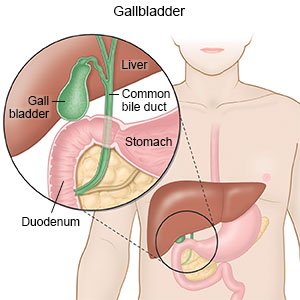ERCP (Endoscopic Retrograde Cholangiopancreatography)
Medically reviewed by Drugs.com. Last updated on Aug 4, 2025.
AMBULATORY CARE:
What you need to know about endoscopic retrograde cholangiopancreatography (ERCP):
ERCP is a procedure to examine the ducts of your pancreas or gallbladder. ERCP may also be used to open blocked ducts, or to diagnose problems with your pancreas or gallbladder. An endoscope (thin, flexible tube with a light) will be used for the procedure.
 |
How to prepare for ERCP:
- Your healthcare provider will talk to you about how to prepare for your procedure. He or she may tell you not to eat or drink anything after midnight on the day of your procedure. Tell your provider about all medicines you currently take. He or she will tell you if you need to stop any medicine before your procedure, and when to stop. He or she will tell you which medicines to take or not take on the day of your procedure.
- Tell your provider about all allergies you have. Tell him or her if you had an allergic reaction to a medicine, contrast liquid, anesthesia, or antibiotics.
- Arrange to have someone drive you home from your procedure.
What will happen during ERCP:
- You will be given medicines to help you relax, make you drowsy, and prevent coughing or gagging. Your healthcare provider will insert the endoscope through your mouth and down into your stomach and upper intestine. He or she will watch the monitor as he or she moves the scope.
- Your provider will then insert a catheter through the scope and into an opening that leads to your pancreas and gallbladder. He or she will inject contrast liquid and take x-rays to see the ducts better. He or she may insert a tool to remove a blockage or to place a stent to open a plugged duct. A tissue sample may be taken.
What to expect after ERCP:
- You may have a sore throat for a day or two.
- You may have abdominal pain or feel bloated. You may also feel nauseated. These symptoms should go away in a few hours.
Related medications
Risks of ERCP:
You may develop an infection from the scope or tools used during the procedure. The infection may be resistant to medicines used for treatment. The scope or tools may injure your esophagus, stomach, or intestines. ERCP may increase your risk for an abdominal infection or pancreatitis (inflammation of the pancreas). You may also have problems with your lungs or trouble breathing. These problems may become life-threatening.
Call your doctor if:
- You have sudden, severe abdominal pain.
- You have problems swallowing.
- Your heart beats faster than normal for you.
- You have black, sticky bowel movements.
- You feel weak, lightheaded, or faint.
- You have a fever and chills.
- You have nausea or are vomiting.
- Your abdomen is bloated or feels full and hard.
- You have abdominal pain.
- You lose your appetite, your skin feels itchy, and your skin turns yellow.
- You have questions or concerns about your procedure.
Self-care:
- Rest when you feel it is needed. You may be drowsy for up to 24 hours after your procedure. Return to your daily activities as directed.
- Ask when you can eat regular foods. Healthy foods include fruits, vegetables, whole-grain breads, low-fat dairy products, beans, lean meats, and fish.
- Relieve a sore throat with ice chips, liquids, or lozenges as directed.
- Do not take aspirin after your procedure unless your healthcare provider says it is okay. Aspirin may increase your risk for bleeding.
Follow up with your doctor as directed:
Write down your questions so you remember to ask them during your visits.
© Copyright Merative 2025 Information is for End User's use only and may not be sold, redistributed or otherwise used for commercial purposes.
The above information is an educational aid only. It is not intended as medical advice for individual conditions or treatments. Talk to your doctor, nurse or pharmacist before following any medical regimen to see if it is safe and effective for you.
Further information
Always consult your healthcare provider to ensure the information displayed on this page applies to your personal circumstances.
